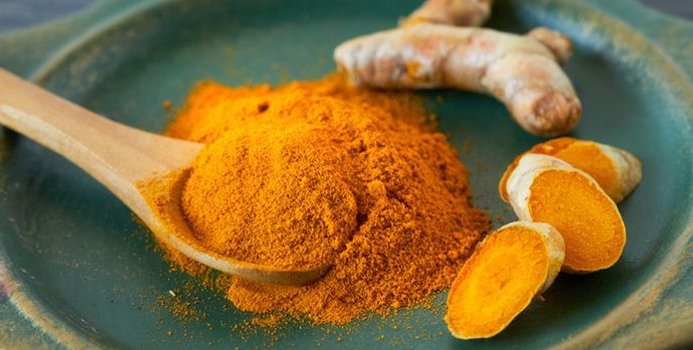Using spices is a great way to experiment in the kitchen, and is often recommended by dietitians as a replacement for salt in an effort to reduce sodium intake. In addition to improving flavor, many spices also have beneficial properties. Turmeric has received a lot of attention and has been linked with reducing inflammation and prevention of some diseases. But should we believe the hype?
Let’s look at the evidence.
First, some background. Turmeric is a root, related to ginger root; the powder of the root has long been used in India and other Asian countries, in cooking but also in traditional medicines to aid digestion and relieve arthritis pain. It is found in many curry dishes and is distinctive by its yellow coloring (it is even used as a food dye in some cases).
In research and news articles, it is typically a compound in turmeric called curcumin that has been linked to health benefits like anti-inflammation. Inflammation is part of the body’s immune response to stress and is a necessary function. However, with poor diet, lack of exercise, pollution, and stress, chronic low-grade inflammation can occur and increases the risk of chronic diseases like heart disease, diabetes, arthritis, metabolic syndrome, and cancer. Anything that can help fight chronic inflammation is crucial in preventing these diseases.
Curcumin is an antioxidant that works to counteract this inflammation, thus reducing the risk of chronic disease. Some studies have even shown protective nervous system benefits, with a decreased risk of Alzheimer’s disease. However, most studies use very high doses of curcumin, because the curcumin content of turmeric is only around 3 percent by weight. These amounts of curcumin are nearly impossible to consume in the typical diet by using turmeric in cooking; therefore, supplements are used in these studies.
Additionally, rates of gastrointestinal cancer and Alzheimer’s disease are significantly lower in countries that use higher amounts of turmeric than in western countries where it is not often used; one theory is that this is due to spices used in cooking like turmeric.
Unfortunately, curcumin is poorly absorbed into the bloodstream. However, eating black pepper with it actually greatly enhances the absorption of curcumin. If you are seeking the anti-inflammatory benefits of high doses of curcumin and are considering a supplement, speak with your doctor as high levels of curcumin can act as an anticoagulant (blood thinner).
Easy ways to add turmeric in cooking:
Rub turmeric and olive oil onto chicken prior to baking
Add a few tablespoons to chili
Try curried dishes that include turmeric
[Image via Getty]



